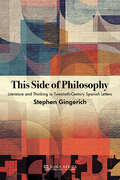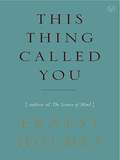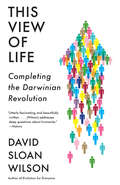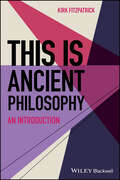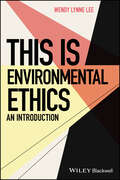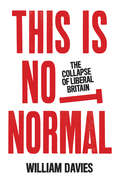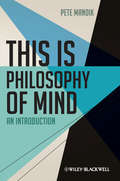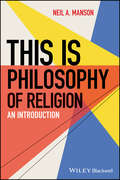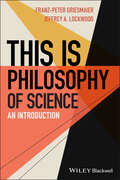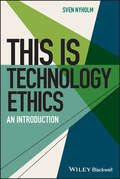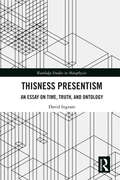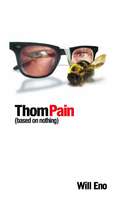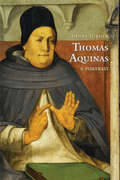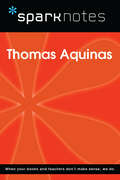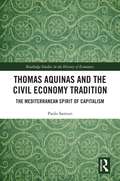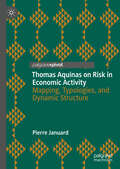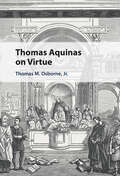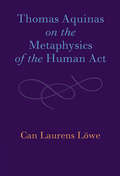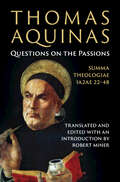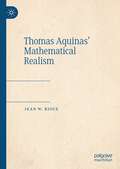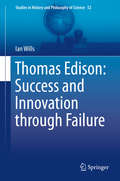- Table View
- List View
This Side of Philosophy: Literature and Thinking in Twentieth-Century Spanish Letters (SUNY series, Literature . . . in Theory)
by Stephen GingerichStruck by the contrast between the prestige of their literary tradition and their apparent philosophical insignificance, modern writers from Spain have devoted themselves to exploring the relation between literature and philosophy. This Side of Philosophy focuses on four major authors—Miguel de Unamuno, José Ortega y Gasset, Antonio Machado, and María Zambrano—who engage literary resources in order to reach beyond philosophy to the essential sources of life. Connecting their work to that of other European thinkers dedicated to illuminating the fertile interaction of literature and philosophy—especially Plato, Schlegel, Heidegger, and Derrida—Stephen Gingerich makes a case for the relevance of Spanish thought to contemporary efforts to expand the ethical and theoretical powers of thinking through literature. At the same time, Gingerich challenges the conventional view that contemporary Spanish thought fuses or reconciles literature and philosophy, instead discerning a call to appreciate their difference in relation. For these writers, literature and philosophy are repulsed by each other as inexorably as they are drawn together.
This Thing Called You (New Thought Library)
by Ernest HolmesThe inspiration of Ernest Holmes has reached hundreds of thousands of readers through his classic works, many of which are just now becoming available in paperback. Originally published in the first half of the twentieth century, these meditative, concise volumes have never previously appeared in paperback. Whether a newcomer to the philosophy Holmes founded or a veteran reader, you will find great power and practicality in the words that render Holmes one of the most celebrated and beloved mystical teachers of the past hundred years. .
This Vast Southern Empire
by Matthew KarpMost leaders of the U.S. expansion in the years before the Civil War were southern slaveholders. As Matthew Karp shows, they were nationalists, not separatists. When Lincoln's election broke their grip on foreign policy, these elites formed their own Confederacy not merely to preserve their property but to shape the future of the Atlantic world.
This View of Life: Completing the Darwinian Revolution
by David Sloan WilsonIt is widely understood that Charles Darwin’s theory of evolution completely revolutionized the study of biology. Yet, according to David Sloan Wilson, the Darwinian revolution won’t be truly complete until it is applied more broadly—to everything associated with the words “human,” “culture,” and “policy.”In a series of engaging and insightful examples—from the breeding of hens to the timing of cataract surgeries to the organization of an automobile plant—Wilson shows how an evolutionary worldview provides a practical tool kit for understanding not only genetic evolution but also the fast-paced changes that are having an impact on our world and ourselves. What emerges is an incredibly empowering argument: If we can become wise managers of evolutionary processes, we can solve the problems of our age at all scales—from the efficacy of our groups to our well-being as individuals to our stewardship of the planet Earth.
This is Ancient Philosophy: An Introduction (This is Philosophy)
by Kirk FitzpatrickTHIS IS ANCIENT PHILOSOPHY “A masterful introduction to ancient philosophy. Fitzpatrick knows the contemporary scholarship on these authors, so he can shift from summarizing their thought to scrutinizing individual arguments. Meanwhile the writing remains so accessible that a reader might not notice how much he covers. The prose is precise but relaxed, with details that enrich the texture: the Pythagoreans’ harmonies, the Stoic Horned Argument, Antisthenes’ daily walk to Socrates. Students and instructors alike will benefit.” —Nickolas Pappas, Professor at City College of New York (CUNY) This Is Ancient Philosophy is a fascinating introduction to the major philosophers and foundational concepts of classical antiquity. Assuming no prior knowledge, the book uses an intuitive, readable narrative style as it examines the ideas, influences, and interconnections of philosophers such as Socrates, the Sophists, Plato, and Aristotle, as well as philosophical schools of thought including Cynicism, Epicureanism, Stoicism, and Skepticism. Divided into three parts, the book opens with an overview of early Greek philosophy, describing the turn from mythological thinking to philosophical analysis. The second part focuses on the distinctions between the subjects of philosophy in both the Golden Age and today, followed by a survey of the Hellenistic period and a discussion of the relation between fate and freedom of action. Throughout, readers are aided by a wealth of instructive and engaging charts, grids, figures, and a detailed map illustrating the chronological development of philosophy, from Asia Minor to southern Italy and Athens. Part of the popular This Is Philosophy series, This Is Ancient Philosophy is an excellent text for students of philosophy, both introductory and advanced, and general readers with interest in the philosophy of the classical era.
This is Environmental Ethics: An Introduction (This is Philosophy)
by Wendy Lynne LeeProvides students and scholars with a comprehensive introduction to the growing field of environmental philosophy and ethics Mitigating the effects of climate change will require global cooperation and lasting commitment. Of the many disciplines addressing the ecological crisis, philosophy is perhaps best suited to develop the conceptual foundations of a viable and sustainable environmental ethic. This is Environmental Ethics provides an expansive overview of the key theories underpinning contemporary discussions of our moral responsibilities to non-human nature and living creatures. Adopting a critical approach, author Wendy Lynne Lee closely examines major moral theories to discern which ethic provides the compass needed to navigate the social, political, and economic challenges of potentially catastrophic environmental transformation, not only, but especially the climate crisis. Lee argues that the ethic ultimately adopted must make the welfare of non-human animals and plant life a priority in our moral decision-making, recognizing that ecological conditions form the existential conditions of all life on the planet. Throughout the text, detailed yet accessible chapters demonstrate why philosophy is relevant and useful in the face of an uncertain environmental future. Questions which environmental theory might best address the environmental challenges of climate change and the potential for recurring pandemic Discusses how inequalities of race, sex, gender, economic status, geography, and species impact our understanding of environmental dilemmas Explores the role of moral principles in making decisions to resolve real-world dilemmas Incorporates extensive critiques of moral extensionist and ecocentric arguments Introduces cutting-edge work done by radical &“deep green&” writers, animal rights theorists, eco-phenomenologists, and ecofeminists This is Environmental Ethics is essential reading for undergraduate students in courses on philosophy, geography, environmental studies, feminist theory, ecology, human and animal rights, and social justice, as well as an excellent graduate-level introduction to the key theories and thinkers of environmental philosophy.
This is Not Normal: The Collapse of Liberal Britain
by William DaviesWhat just happened and how did we get into this mess?Since 2016, the UK has been in a crisis of its own making: but this is not the fault of Brexit but of a larger problem of our politics. The status of political parties, the mainstream media, public experts and officials have all been disrupted. Along the way, there have been shocking and exhilarating events: the unforeseen 2017 election result, the horrific details of Grenfell Tower and the Windrush scandal, the sudden rise and fall of the Brexit Party.As the 'mainstream' of politics and media has come under attack, the basic norms of public life have been thrown into question.This Is Not Normal takes stock of a historical moment that no longer recognises itself. Davies tells a story of the apparently chaotic and irrational events, and extracts their underlying logic and long-term causes. What we are seeing is the effects of the 2008 financial crash, the failure of the British neoliberal project, the dying of Empire, and the impact of the changes that technology and communications have had on the idea of the public sphere as well as the power of information. This is an essential book for anyone who wants to make sense of this current moment.
This is Philosophy of Mind
by Pete MandikThis is Philosophy of Mind presents students of philosophy with an accessible introduction to the core issues related to the philosophy of mind.Includes issues related to the mind-body problem, artificial intelligence, free will, the nature of consciousness, and moreWritten to be accessible to philosophy students early in their studiesFeatures supplemental online resources on www.thisisphilosophy.com and a frequently updated companion blog, at http://tipom.blogspot.com
This is Philosophy of Religion: An Introduction (This is Philosophy)
by Neil A. MansonA reader-friendly introduction to the essential concepts, theories, and questions in analytic philosophy of religion Does God exist? If so, what is God's relationship to us? Do we have free will? This is Philosophy of Religion surveys foundational topics in the philosophy of religion using a clear and accessible style. Straightforward and easy to comprehend for those with no prior philosophical background, this engaging introduction familiarizes readers with the vocabulary, methods, and major concepts in the philosophy of religion, and invites them to think through questions which arise in the intersection of philosophy, theology, and religious studies. Part of the popular This is Philosophy series, this book applies the basic investigative methods of philosophy to questions of religion, faith, and morality. Chapters offer a framework for thinking about religion, present arguments for and against the existence of God, discuss religious diversity, consider the intellectual co-existence of faith and reason, and examine different theories about why people are religious. Examples and illustrations taken from popular culture reinforce the subject’s contemporary relevance, and are complemented by a wealth of online resources for instructors on the This is Philosophy series site that encourage further reading and strengthen student comprehension of key concepts. A dependable introduction to the philosophy of religion, This is Philosophy of Religion is an ideal gateway to the discipline for readers who want to engage with questions about religion and contemplate the philosophical implications of religious belief.
This is Philosophy of Science: An Introduction (This is Philosophy)
by Jeffrey A. Lockwood Franz-Peter GriesmaierA clear and engaging introduction to the philosophy of science, exploring the role of science within the broader framework of human knowledge and engagement with the world What are the central features and advantages of a scientific worldview? Why do even reasonable scientists sometimes disagree with each other? How are scientific methods different than those of other disciplines? Can science provide an objective account of reality? This is Philosophy of Science introduces the most important philosophical issues that arise within the empirical sciences. Requiring no previous background in philosophy, this reader-friendly volume covers topics ranging from traditional questions about the nature of explanation and the confirmation of theories to practical issues concerning the design of physical experiments and modeling. Incisive and accessible chapters with relevant case-studies and informative illustrations examine the function of thought experiments, discuss the realism/anti-realism debate, explore probability and theory testing, and address more challenging topics such as emergentism, measurement theory, and the manipulationist account of causation. Describes key philosophical concepts and their application in the empirical sciences Highlights past and present philosophical debates within the field Features numerous illustrations, real-world examples, and references to additional resources Includes a companion website with self-assessment exercises and instructor-only test banks Part of Wiley-Blackwell’s popular This Is Philosophy series, This is Philosophy of Science: An Introduction is an excellent textbook for STEM students with interest in the conceptual foundations of their disciplines, undergraduate philosophy majors, and general readers looking for an easy-to-read overview of the subject.
This is Technology Ethics: An Introduction (This is Philosophy)
by Sven NyholmAn approachable introduction to the philosophical study of ethical dilemmas in technology In the Technology Age, innovations in medical, communications, and weapons technologies have given rise to many new ethical questions: Are technologies always value-neutral tools? Are human values and human prejudices sometimes embedded in technologies? Should we merge with the technologies we use? Is it ethical to use autonomous weapons systems in warfare? What should a self-driving car do if it detects an unavoidable crash? Can robots have morally relevant properties? This is Technology Ethics: An Introduction provides an accessible overview of the sub-field of philosophy that focuses on the ethical implications of new technologies. Requiring no previous background in the subject, this reader-friendly volume explores ethical questions concerning artificial intelligence, robots, self-driving cars, brain implants, social media and communication technologies, and more. Throughout the book, clear and engaging chapters describe and discuss key discussions, issues, and themes while inviting readers to develop their own perspectives on a wide range of moral and ethical questions. Discusses how various technologies influence and shape individuals and society both positively and negatively Illustrates how emerging technologies affect traditional ideas about ethics and human self-understanding Addresses the ethical complications of creating technologies that may lead to morally problematic consequences Considers if the benefits of new technologies outweigh potential drawbacks, such as how people interact online through social media Explores how established moral and ethical theories relate to new questions concerning advanced technologies Part of the popular This is Philosophy series published by Wiley-Blackwell, This is Technology Ethics: An Introduction is a must-read for undergraduate students taking a Technology Ethics course, researchers in the field, engineers, technology professionals, and general readers looking to learn more about the topic.
Thisness Presentism: An Essay on Time, Truth, and Ontology (Routledge Studies in Metaphysics)
by David IngramThisness Presentism outlines and defends a novel version of presentism, the view that only present entities exist and what is present really changes, a view of time that captures a real and objective difference between what is past, present, and future, and which offers a model of reality that is dynamic and mutable, rather than static and immutable. The book advances a new defence of presentism by developing a novel ontology of thisness, combining insights about the nature of essence, the metaphysics of propositions, and the relationship between true propositions and the elements of reality that make them true, alongside insights about time itself. It shows how, by accepting an ontology of thisness, presentists can respond to a number of pressing challenges to presentism, including claims that presentism cannot account for true propositions about the past, and that it is inconsistent with the reality of temporal passage and the openness of the future. This is one of the only book-length defences of presentism. It will be of interest to students and scholars working on the debate about presentism in the philosophy of time, as well as those interested in the metaphysics of propositions and truth-making, more generally.
Thom Pain (based on nothing) [Trade Edition]
by Will Eno"Astonishing in its impact. . . One of the treasured nights in the theatre that can leave you both breathless with exhilaration and, depending on your sensitivity to meditations on the bleak and beautiful mysteries of human experience, in a puddle of tears . . . Thom Pain is at bottom a surreal meditation on the empty promises life makes, the way experience never lives up to the weird and awesome fact of being. But it is also, in its odd, bewitching beauty, an affirmation of life's worth."--Charles Isherwood, The New York Times"Eno has emerged as one of the most original young playwrights on the scene. He is one of the few writers who can convert discomfort and outright agony into such pleasure."--David Cote, TimeOut New York"Will Eno is one of the finest younger playwrights I've come across in a number of years. His work is inventive, disciplined and, at the same time, wild and evocative."--Edward AlbeeWhen Will Eno's one-person play Thom Pain opened in New York in February 2005, it became something rare--an unqualified hit, which soon extended through July. Before that, the play was a critical success in London and received the coveted Fringe First Award at the Edinburgh Festival. Dubbed "stand-up existentialism" by The New York Times, it is lyrical and deadpan, both sardonic and sincere. It is Thom Pain--in the camouflage of the common man--fumbling with his heart, squinting into the light.Will Eno lives in Brooklyn, New York. His plays include The Flu Season, Tragedy: a tragedy, King: a problem play, and Intermission. His plays have been produced in London by the Gate Theatre and BBC Radio, and in the United States by Rude Mechanicals and Naked Angels. His play The Flu Season recently won the Oppenheimer Award, presented by NY Newsday for the previous year's best debut production in New York by an American playwright.
Thomas Aquinas
by Denys TurnerLeaving so few traces of himself behind, Thomas Aquinas seems to defy the efforts of the biographer. Highly visible as a public teacher, preacher, and theologian, he nevertheless has remained nearly invisible as man and saint. What can be discovered about Thomas Aquinas as a whole? In this short, compelling portrait, Denys Turner clears away the haze of time and brings Thomas vividly to life for contemporary readers--those unfamiliar with the saint as well as those well acquainted with his teachings.Building on the best biographical scholarship available today and reading the works of Thomas with piercing acuity, Turner seeks the point at which the man, the mind, and the soul of Thomas Aquinas intersect. Reflecting upon Thomas, a man of Christian Trinitarian faith yet one whose thought is grounded firmly in the body's interaction with the material world, a thinker at once confident in the powers of human reason and a man of prayer, Turner provides a more detailed human portrait than ever before of one of the most influential philosophers and theologians in all of Western thought.
Thomas Aquinas (SparkNotes Philosophy Guide)
by SparkNotesThomas Aquinas (SparkNotes Philosophy Guide) Making the reading experience fun! SparkNotes Philosophy Guides are one-stop guides to the great works of philosophy–masterpieces that stand at the foundations of Western thought. Inside each Philosophy Guide you&’ll find insightful overviews of great philosophical works of the Western world.
Thomas Aquinas - Selected Writings
by Ralph Mcinerny Thomas AquinasIn his reflections on Christianity, Saint Thomas Aquinas forged a unique synthesis of ancient philosophy and medieval theology. Preoccupied with the relationship between faith and reason, he was influenced both by Aristotle's rational world view and by the powerful belief that wisdom and truth can ultimately only be reached through divine revelation. Thomas's writings, which contain highly influential statements of fundamental Christian doctrine, as well as observations on topics as diverse as political science, anti-Semitism and heresy, demonstrate the great range of his intellect and place him firmly among the greatest medieval philosophers. For more than seventy years, Penguin has been the leading publisher of classic literature in the English-speaking world. With more than 1,700 titles, Penguin Classics represents a global bookshelf of the best works throughout history and across genres and disciplines. Readers trust the series to provide authoritative texts enhanced by introductions and notes by distinguished scholars and contemporary authors, as well as up-to-date translations by award-winning translators.
Thomas Aquinas and the Civil Economy Tradition: The Mediterranean Spirit of Capitalism (Routledge Studies in the History of Economics)
by Paolo SantoriDelving into the history of economic thought, this book presents a picture of the Mediterranean spirit of capitalism, a tradition that has its protagonists in Thomas Aquinas and the eighteenth-century civil economy, and seeks to understand its presence and relevance for contemporary societies. The book argues that it is reductive to attribute to the ‘Protestant ethic’ the different formations of capitalism in the Western world. Instead, it is vital to acknowledge the differences in the ways in which the market is lived, enterprises are created and conducted, and civic life in general is understood in different regions. This thought-provoking study demonstrates that in Southern Europe, the legacy of Aquinas and the civil economy adds different terms to those recurring in classical and neo-classical economy: common good, reciprocity, virtue, public trust, mutual assistance, and public happiness. It is these ideas of a market as a place for mutual assistance which can be said to characterize the Mediterranean spirit of capitalism. Thomas Aquinas and the Civil Economy Tradition will be of interest to advanced students and researchers in the history of economic thought, economic philosophy, Christian ethics, and moral theology.
Thomas Aquinas on Risk in Economic Activity: Mapping, Typologies, and Dynamic Structure
by Pierre JanuardThis book provides a detailed look at Thomas Aquinas’s view and understanding of economic activity. The work of Aquinas, one of the greatest thinkers of the Middle Ages, is contextualised within his own experiences, the history of the era, and the socio-economic changes underway in 13th-century Europe. Particular attention is paid to Aquinas’s approach to risk, mapping out the different forms of risk he addresses, establishing typologies, and presenting it as a dynamic structure. This book offers unique insight into the economic work of Thomas Aquinas. It will be relevant to students and researchers interested in the history of economic thought, economic analysis of risk, medieval studies, philosophy, and theology.
Thomas Aquinas on Virtue
by Thomas M. Osborne JrThomas Aquinas produced a voluminous body of work on moral theory, and much of that work is on virtue, particularly the status and value of the virtues as principles of virtuous acts, and the way in which a moral life can be organized around them schematically. Thomas Osborne presents Aquinas's account of virtue in its historical, philosophical and theological contexts, to show the reader what Aquinas himself wished to teach about virtue. His discussion makes the complexities of Aquinas's moral thought accessible to readers despite the differences between Thomas's texts themselves, and the distance between our background assumptions and his. The book will be valuable for scholars and students in ethics, medieval philosophy, and theology.
Thomas Aquinas on War and Peace
by Gregory M. ReichbergInquiring 'whether any war can be just', Thomas Aquinas famously responded that this may hold true, provided the war is conducted by a legitimate authority, for a just cause, and with an upright intention. Virtually all accounts of just war, from the Middle Ages to the current day, make reference to this threefold formula. But due in large measure to its very succinctness, Aquinas's theory has prompted contrasting interpretations. This book sets the record straight by surveying the wide range of texts in his literary corpus that have bearing on peace and the ethics of war. Thereby emerges a coherent and nuanced picture of just war as set within his systematic moral theory. It is shown how Aquinas deftly combined elements from earlier authors, and how his teaching has fruitfully propelled inquiry on this important topic by his fellow scholastics, later legal theorists such as Grotius, and contemporary philosophers of just war.
Thomas Aquinas on the Metaphysics of the Human Act
by Can Laurens LöweThis book offers a novel account of Aquinas's theory of the human act. It argues that Aquinas takes a human act to be a composite of two power-exercises, where one relates to the other as form to matter. The formal component is an act of the will, and the material component is a power-exercise caused by the will, which Aquinas refers to as the 'commanded act.' The book also argues that Aquinas conceptualizes the act of free choice as a hylomorphic composite: it is, materially, an act of the will, but it inherits a form from reason. As the book aims to show, the core idea of Aquinas's hylomorphic action theory is that the exercise of one power can structure the exercise of another power, and this provides a helpful way to think of the presence of cognition in conation and of intention in bodily movement.
Thomas Aquinas: Summa Theologiae 1a2ae 22-48
by Robert MinerThomas Aquinas's Questions on the passions form part of the Summa Theologiae, Aquinas's best-known work. This first standalone edition shows, through a translation that is both rigorously accurate and mirrors the rapid tempo of Aquinas's Latin, what Aquinas says in his landmark treatment of the passions. Aquinas sets the parameters and terms of debate for numerous later theorists of the passions, including Descartes, Hobbes, Spinoza and Hume. Some have alleged that Paul and later Christians have (in Nietzsche's words) “an evil eye for the passions,” judging them as 'dirty, disfiguring and heartbreaking'. Yet readers of the present translation will perceive that Aquinas regards the passions as part of created nature, and thereby good in their essence. As they encounter Aquinas's treatment, they will also deepen their knowledge of particular passions-including love, hatred, desire, aversion, pleasure, sorrow, hope, despair, fear, and anger.
Thomas Aquinas’ Mathematical Realism
by Jean W. RiouxIn this book, philosopher Jean W. Rioux extends accounts of the Aristotelian philosophy of mathematics to what Thomas Aquinas was able to import from Aristotle’s notions of pure and applied mathematics, accompanied by his own original contributions to them. Rioux sets these accounts side-by-side modern and contemporary ones, comparing their strengths and weaknesses.
Thomas Edison: Success and Innovation through Failure (Studies in History and Philosophy of Science #52)
by Ian WillsThis book develops a systematic approach to the role of failure in innovation, using the laboratory notebooks of America's most successful inventor, Thomas Edison. It argues that Edison's active pursuit of failure and innovative uses of failure as a tool were crucial to his success. From this the author argues that not only should we expect innovations to fail but that there are good reasons to want them to fail. Using Edison's laboratory notebooks, written as he worked and before he knew the outcome we see the many false starts, wrong directions and failures that he worked through on his way to producing revolutionary inventions. While Edison's strengths in exploiting failure made him the icon of American inventors, they could also be liabilities when he moved from one field to another. Not only is this book of value to readers with an interest in the history of technology and American invention, its insights are important to those who seek to innovate and to those who employ and finance them.
Thomas Hardy and Desire
by Jane ThomasDrawing on a broad concept of desire, informed by poststructuralist theorists this book examines the range of Hardy's work. It demonstrates the sustained nature of his thinking about desire, its relationship to the social and symbolic network in which human subjectivity is constituted and art's potential to offer fulfilment to the desiring subject.
